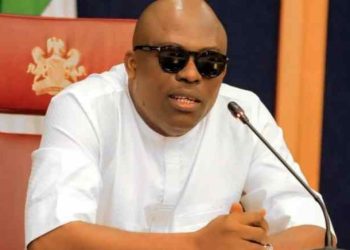*Accuses Buhari of complicity
Mr. Femi Falana, SAN, human rights lawyer, has dismissed the 48-hour ultimatum given by the Department of State Services (DSS) to the Nigerian National Petroleum Company (NNPC) Limited and oil marketers in Nigeria to end the lingering fuel scarcity in the country or face severe consequences.
Falana, who appeared on Channels Television breakfast programme, Sunrise Daily, Friday, while laughing off the threat as empty words that would be ignored, said it did not even lie in the mouth of the nation’s secret police to give such directives.
Peter Afunanya, DSS Spokesman, had on Thursday, delivered the ultimatum to reporters as a fallout of a meeting with the stakeholders in the petroleum distribution network, following the current scarcity of Premium Motor Spirit (PMS), which has once again dislocated economic activities across the country.
Waving off the threat, Falana, who stressed that it was the responsibility of the NNPC to supply petroleum products to all parts of Nigeria, argued that rather than the DSS making empty threats, President Muhammadu Buhari, who is the Minister of Petroleum Resources to hold the company and its officials to account.
His words: “You know, every year, at the end of the year – once it is Christmas – there must be artificial supply of fuel. The ultimatum will not work because there is no sanction for impunity in Nigeria. The State Security Service (SSS) does not operate under the law in Nigeria. It does its own thing. There is nobody to call the agency to order. They will know that it’s just an empty threat because nobody is going to be arrested and prosecuted to teach a lesson.
“The other day, toxic fuel was brought to Nigeria. The government promised, ‘we’re going to deal with them, it will never happen again.’ Was anybody arrested? Was anybody prosecuted? It’s the same thing because they know the people behind it. It’s like oil theft. They know them.”
Even though he acknowledged that economic sabotage could be a strong ground for the DSS to move against those involved, argued that the continued presence of long queues at filling stations could lead to “serious security problems,” stressing that the best the agency could do in the circumstances was to collaborate with the police by uploading the information it had on the perpetrators of the sabotage, for appropriate actions to be taken.
“So, this agency is a secret agency required to submit reports – ‘We fear that there will be a threat to the security in Nigeria’ – and the President will then take appropriate action. We must run this country in line with the provisions of the law. That (enactment establishing the DSS) is a decree made by the military. But now, we have the constitution. Section 215 has imposed a duty on the police to maintain the internal security of the country.
“But what the SSS – not DSS; it is not a department of state security. It is not a department of the Presidency. It’s the State Security Service for all of us. That body is required to submit reports to the government – ‘this problem may lead to insecurity. What can we do very quickly?’ The internal security of our country is the role of the police.”
Announcing the 48-hour ultimatum on Thursday, the DSS stated that the challenge of fuel scarcity had assumed a dimension that was detrimental to the security of the country.
Afunanya, who spoke at the headquarters of the secret police in Abuja after over three hours closed-door meeting with stakeholders in the petroleum sector, confirmed the availability of PMS during and after the Yuletide season.
For weeks, vehicle owners especially in Lagos and Abuja have had a tough time getting petrol from filling stations. Whilst many outlets are closed, the few ones that are open sell the indispensable commodity for as high as N250 per litre from the uniform price of N169/litre.
The shortage of supply has led to long, grueling snake-like queues at the few open filling stations as motorists and business owners jostle to buy fuel while others resort to black market. The situation has also worsened traffic on major roads as vehicle owners block at least one lane to join queues to filling stations.







